How to create a financial forecast for a security brokerage firm?
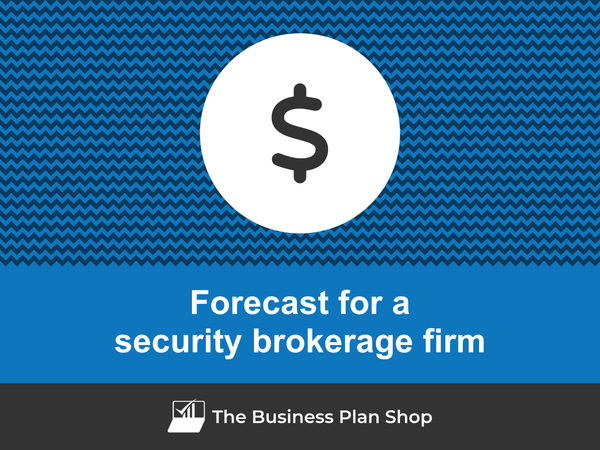
If you are serious about keeping visibility on your future cash flows, then you need to build and maintain a financial forecast for your security brokerage firm.
Putting together a security brokerage firm financial forecast may sound complex, but don’t worry, with the right tool, it’s easier than it looks, and The Business Plan Shop is here to guide you.
In this practical guide, we'll cover everything you need to know about building financial projections for your security brokerage firm.
We will start by looking at why they are key, what information is needed, what a forecast looks like once completed, and what solutions you can use to create yours.
Let's dive in!
Why create and maintain a financial forecast for a security brokerage firm?
In order to prosper, your business needs to have visibility on what lies ahead and the right financial resources to grow. This is where having a financial forecast for your security brokerage firm becomes handy.
Creating a security brokerage firm financial forecast forces you to take stock of where your business stands and where you want it to go.
Once you have clarity on the destination, you will need to draw up a plan to get there and assess what it means in terms of future profitability and cash flows for your security brokerage firm.
Having this clear plan in place will give you the confidence needed to move forward with your business’s development.
Having an up-to-date financial forecast for a security brokerage firm is also useful if your trading environment worsens, as the forecast enables you to adjust to your new market conditions and anticipate any potential cash shortfall.
Finally, your security brokerage firm's financial projections will also help you secure financing, as banks and investors alike will want to see accurate projections before agreeing to finance your business.
Need a convincing business plan?
The Business Plan Shop makes it easy to create a financial forecast to assess the potential profitability of your projects, and write a business plan that’ll wow investors.

What information is used as input to build a security brokerage firm financial forecast?
A security brokerage firm's financial forecast needs to be built on the right foundation: your assumptions.
The data required to create your assumptions will depend on whether you are a new or existing security brokerage firm.
If you are creating (or updating) the forecast of an existing security brokerage firm, then your main inputs will be historical accounting data and operating metrics, and your team’s view on what to expect for the next three to five years.
If you are building financial projections for a new security brokerage firm startup, you will need to rely on market research to form your go-to-market strategy and derive your sales forecast.
For a new venture, you will also need an itemised list of resources needed for the security brokerage firm to operate, along with a list of equipment required to launch the venture (more on that below).
Now that you understand what is needed, let’s have a look at what elements will make up your security brokerage firm's financial forecast.
The sales forecast for a security brokerage firm
From experience, it is usually best to start creating your security brokerage firm financial forecast by your sales forecast.
To create an accurate sales forecast for your security brokerage firm, you will have to rely on the data collected in your market research, or if you're running an existing security brokerage firm, the historical data of the business, to estimate two key variables:
- The average price
- The number of monthly transactions
To get there, you will need to consider the following factors:
- The state of the economy can greatly affect the average price and number of monthly transactions for your security brokerage firm. In a strong economy, more individuals and businesses will have disposable income to invest, leading to potentially higher average prices and more transactions. Conversely, in a weak economy, people may be less likely to invest, resulting in lower average prices and fewer transactions.
- Changes in interest rates can also impact your business's average price and number of monthly transactions. When interest rates are low, more individuals may be inclined to invest in securities, leading to potentially higher average prices and more transactions. On the other hand, when interest rates are high, individuals may be more likely to save their money rather than invest, resulting in lower average prices and fewer transactions.
- The performance of the stock market can also have a significant influence on your business's average price and number of monthly transactions. When the stock market is performing well, there may be more interest and confidence in investing, potentially increasing average prices and the number of transactions. However, if the stock market is experiencing a downturn, individuals may be more hesitant to invest, resulting in lower average prices and fewer transactions.
- Technological advancements can also play a role in your business's sales forecast. For example, the rise of online trading platforms has made it easier for individuals to invest on their own, potentially decreasing the average prices and number of transactions for your brokerage firm. On the other hand, technological advancements that improve the speed and efficiency of trading can attract more investors, potentially increasing your average prices and number of transactions.
- Government regulations and policies can also have an impact on your business's sales forecast. Changes in regulations related to securities trading or taxes can affect the average price and number of monthly transactions for your brokerage firm. For example, if the government introduces more favorable tax incentives for investing, you may see an increase in average prices and transactions. However, if regulations become more restrictive, it could potentially lead to lower average prices and fewer transactions.
Once you have an idea of what your future sales will look like, it will be time to work on your overhead budget. Let’s see what this entails.
Need a convincing business plan?
The Business Plan Shop makes it easy to create a financial forecast to assess the potential profitability of your projects, and write a business plan that’ll wow investors.

The operating expenses for a security brokerage firm
The next step is to estimate the expenses needed to run your security brokerage firm on a day-to-day basis.
These will vary based on the level of sales expected, and the location and size of your business.
But your security brokerage firm's operating expenses should include the following items at a minimum:
- Staff costs: This includes salaries, bonuses, benefits, and training for your employees.
- Accountancy fees: You will need to hire an accountant to manage your financial records and ensure compliance with regulations.
- Insurance costs: As a brokerage firm, you will need to have insurance to protect against potential lawsuits or other risks.
- Software licenses: You will need to purchase licenses for trading platforms, research tools, and other software necessary for your operations.
- Banking fees: This includes fees for maintaining accounts, wire transfers, and other banking services.
- Marketing and advertising: To attract clients, you will need to invest in marketing and advertising efforts such as creating a website, running ads, and attending industry events.
- Rent: If you are not working from home, you will need to pay rent for office space.
- Telephone and internet: You will need reliable phone and internet services to communicate with clients and manage trades.
- Office supplies: This includes basic office supplies such as stationery, printer ink, and paper.
- Professional fees: You may need to hire lawyers or consultants for legal or regulatory advice.
- Travel expenses: As a brokerage firm, you may need to travel for meetings or industry conferences.
- Professional development: To stay current with industry trends and regulations, you may need to invest in professional development for yourself and your employees.
- Utilities: This includes electricity, water, and other utilities necessary to run your office.
- Office maintenance: You will need to allocate funds for office cleaning, repairs, and maintenance.
- Taxes and licenses: As a business, you will need to pay taxes and obtain necessary licenses to operate legally.
This list is, of course, not exhaustive, and you'll have to adapt it according to your precise business model and size. A small security brokerage firm might not have the same level of expenditure as a larger one, for example.
What investments are needed to start or grow a security brokerage firm?
Creating and expanding a security brokerage firm also requires investments which you need to factor into your financial forecast.
Capital expenditures and initial working capital items for a security brokerage firm could include elements such as:
- Computers and Technology: As a security brokerage firm, you will need to invest in technology to stay competitive and efficient. This may include purchasing computers, servers, software, and other hardware to support your operations.
- Office Space and Furniture: Your office space is essential in creating a professional and welcoming atmosphere for your clients. You may need to invest in office furniture, such as desks, chairs, and conference room equipment, as well as lease or purchase office space.
- Security and Surveillance Equipment: As a security brokerage firm, it is crucial to have top-notch security and surveillance measures in place to protect your clients' assets and sensitive information. This may include security cameras, alarm systems, and other equipment.
- Trading and Analytical Tools: In order to provide your clients with accurate and timely information, you may need to invest in trading and analytical tools. This may include software, data feeds, and other resources to help you make informed investment decisions.
- Training and Development: While not considered an operating expense, investing in training and development for your employees is essential in ensuring they have the knowledge and skills to serve your clients effectively. This may include industry-specific training, certifications, and professional development programs.
Again, this list is not exhaustive and will need to be adjusted according to the circumstances of your security brokerage firm.
Need a convincing business plan?
The Business Plan Shop makes it easy to create a financial forecast to assess the potential profitability of your projects, and write a business plan that’ll wow investors.

The financing plan of your security brokerage firm
The next step in the creation of your financial forecast for your security brokerage firm is to think about how you might finance your business.
You will have to assess how much capital will come from shareholders (equity) and how much can be secured through banks.
Bank loans will have to be modelled so that you can separate the interest expenses from the repayments of principal, and include all this data in your forecast.
Issuing share capital and obtaining a bank loan are two of the most common ways that entrepreneurs finance their businesses.
What tables compose the financial plan for a security brokerage firm?
Now let's have a look at the main output tables of your security brokerage firm's financial forecast.
The projected profit & loss statement
The projected profit & loss shows how profitable your security brokerage firm is likely to be in the years to come.
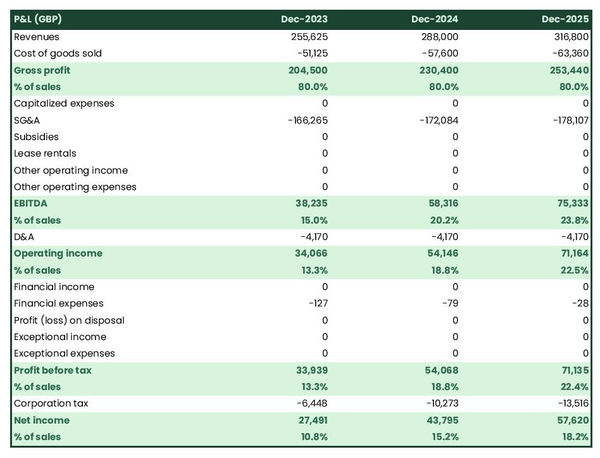
For your security brokerage firm to be financially viable, your projected P&L should ideally show:
- Sales growing above inflation (the higher the better)
- Profit margins which are stable or expanding (the higher the better)
- A net profit at the end of each financial year (the higher the better)
This is for established security brokerage firms, there is some leniency for startups which will have numbers that will look a bit different than existing businesses.
The projected balance sheet
The projected balance sheet gives an overview of your security brokerage firm's financial structure at the end of the financial year.
It is composed of three categories of items: assets, liabilities and equity:
- Assets: are what the business possesses and uses to produce cash flows. It includes resources such as cash, buildings, equipment, and accounts receivable (money owed by clients).
- Liabilities: are the debts of your security brokerage firm. They include accounts payable (money owed to suppliers), taxes due and bank loans.
- Equity: is the combination of what has been invested by the business owners and the cumulative profits to date (which are called retained earnings). Equity is a proxy for the value of the owner's stake in the business.
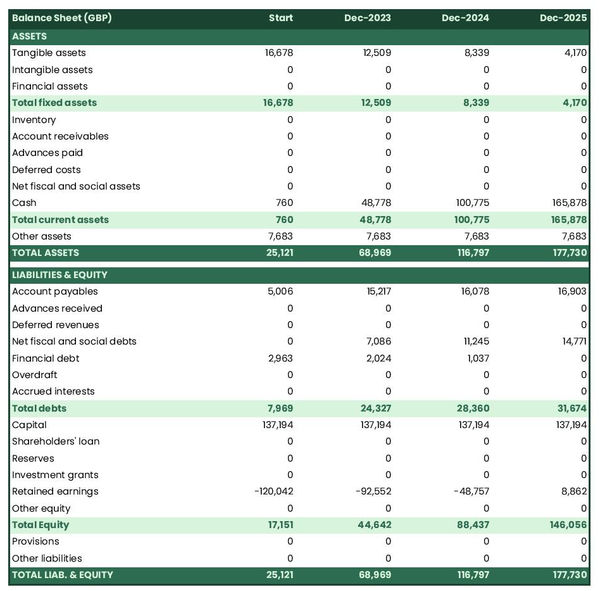
The cash flow forecast
Your security brokerage firm's cash flow forecast shows how much cash your business is expected to consume or generate in the years to come.
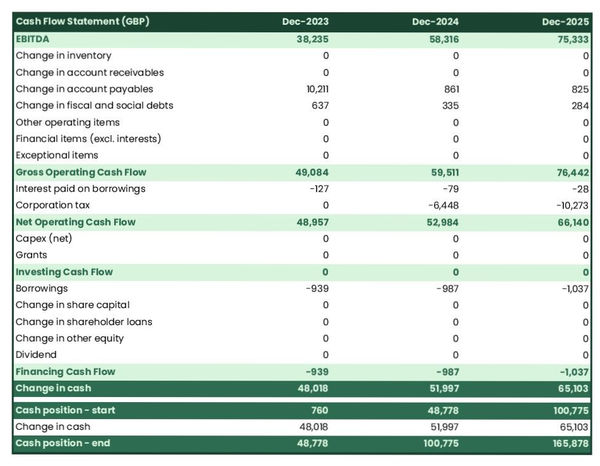
It is best practice to organise the cash flow forecast by nature to better explain where cash is used or generated by the security brokerage firm:
- Operating cash flow: shows how much cash is generated by the operating activities
- Investing cash flow: shows how much will be invested in capital expenditure to maintain or expand the business
- Financing cash flow: shows if the business is raising new capital or repaying financiers (debt repayment, dividends)
Keeping an eye on (and regularly updating) your security brokerage firm's cash flow forecast is key to ensuring that your business has sufficient liquidity to operate normally and to detect financing requirements as early as possible.
If you are trying to raise capital, you will normally be asked to provide a monthly cash flow forecast in your security brokerage firm's financial plan - so that banks or investors can assess seasonal variation and ensure your business is appropriately capitalised.
Need a convincing business plan?
The Business Plan Shop makes it easy to create a financial forecast to assess the potential profitability of your projects, and write a business plan that’ll wow investors.

Which tool should you use to create your security brokerage firm's financial forecast?
Creating your security brokerage firm's financial forecast may sound fairly daunting, but the good news is that there are several ways to go about it.
Using online financial forecasting software to build your security brokerage firm's projections
The modern and easiest way is to use professional online financial forecasting software such as the one we offer at The Business Plan Shop.
There are several advantages to using specialised software:
- You can easily create your financial forecast by letting the software take care of the financial calculations for you without errors
- You have access to complete financial forecast templates
- You get a complete financial forecast ready to be sent to your bank or investors
- You can easily track your actual financial performance against your financial forecast, and recalibrate your forecast as the year goes by
- You can create scenarios to stress test your forecast's main assumptions
- You can easily update your forecast as time goes by to maintain visibility on future cash flows
- You have a friendly support team on standby to assist you when you are stuck
- It’s cost-efficient and much cheaper than using an accountant or consultant (see below)
If you are interested in this type of solution, you can try our forecasting software for free by signing up here.
Calling in a financial consultant or chartered accountant
Enlisting the help of a consultant or accountant is also a good way to obtain a professional security brokerage firm financial forecast.
The downside of this solution is its cost. From experience, obtaining a simple financial forecast over three years (including a balance sheet, income statement, and cash flow statement) is likely to cost a minimum of £700 or $1,000.
The indicative cost above, is for a small business, and a forecast is done as a one-shot exercise. Using a consultant or accountant to track your actuals vs. forecast and to keep your financial projections up to date on a monthly or quarterly basis will cost a lot more.
If you opt for this solution, make sure your accountant has in-depth knowledge of your industry, so that they may challenge your figures and offer insights (as opposed to just taking your assumptions at face value to create the forecast).
Why not use a spreadsheet such as Excel or Google Sheets to build your security brokerage firm's financial forecast?
Creating an accurate and error-free security brokerage firm financial forecast on Excel (or any spreadsheet) is very technical and requires both a strong grasp of accounting principles and solid skills in financial modelling.
Most entrepreneurs lack the expertise required to create an accurate financial forecast using spreadsheet software like Excel or Google Sheets. As a result, it is unlikely anyone will trust your numbers.
The second reason is that it is inefficient. Building forecasts on spreadsheets was the only option in the 1990s and early 2000s, nowadays technology has advanced and software can do it much faster and much more accurately.
This is why professional forecasters all use software. With the rise of AI, software is also becoming smarter at helping us detect mistakes in our forecasts and helping us analyse the numbers to make better decisions.
Finally, like everything with spreadsheets, tracking actuals vs. forecasts and updating your forecast as the year progresses is manual, tedious, error-prone, and time-consuming. Whereas financial forecasting software like The Business Plan Shop is built for this.
Need a convincing business plan?
The Business Plan Shop makes it easy to create a financial forecast to assess the potential profitability of your projects, and write a business plan that’ll wow investors.

Use our financial projection templates for inspiration
The Business Plan Shop has dozens of financial forecasting templates available.
Our examples contain both the financial forecast, and a written business plan which presents, in detail, the company, the team, the strategy, and the medium-term objectives.
Whether you are just starting out or already have your own security brokerage firm, looking at our template is always a good way to get ideas on how to model financial items and what to write when creating a business plan to secure funding.
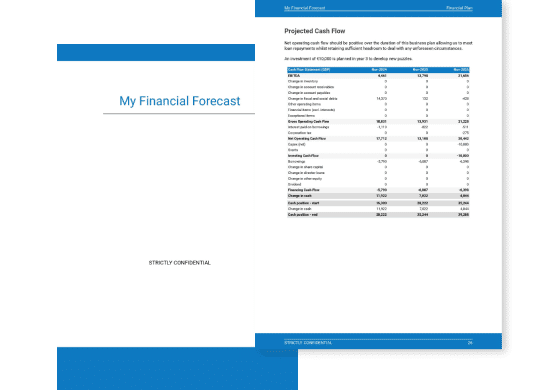
Takeaways
- A financial forecast shows expected growth, profitability, and cash generation metrics for your security brokerage firm.
- Tracking actuals vs. forecast and having an up-to-date financial forecast is key to maintaining visibility on your future cash flows.
- Using financial forecasting software is the modern way of creating and maintaining financial projections.
We hope that this guide helped you gain a clearer perspective on the steps needed to create the financial forecast for a security brokerage firm. Don't hesitate to contact us if you have any questions!
Need a convincing business plan?
The Business Plan Shop makes it easy to create a financial forecast to assess the potential profitability of your projects, and write a business plan that’ll wow investors.

Also on The Business Plan Shop
- Financial forecast example
- How to create a sales forecast for a business?
- Financial forecast for a business idea
Know someone who runs a security brokerage firm? Share our business guide with them!




